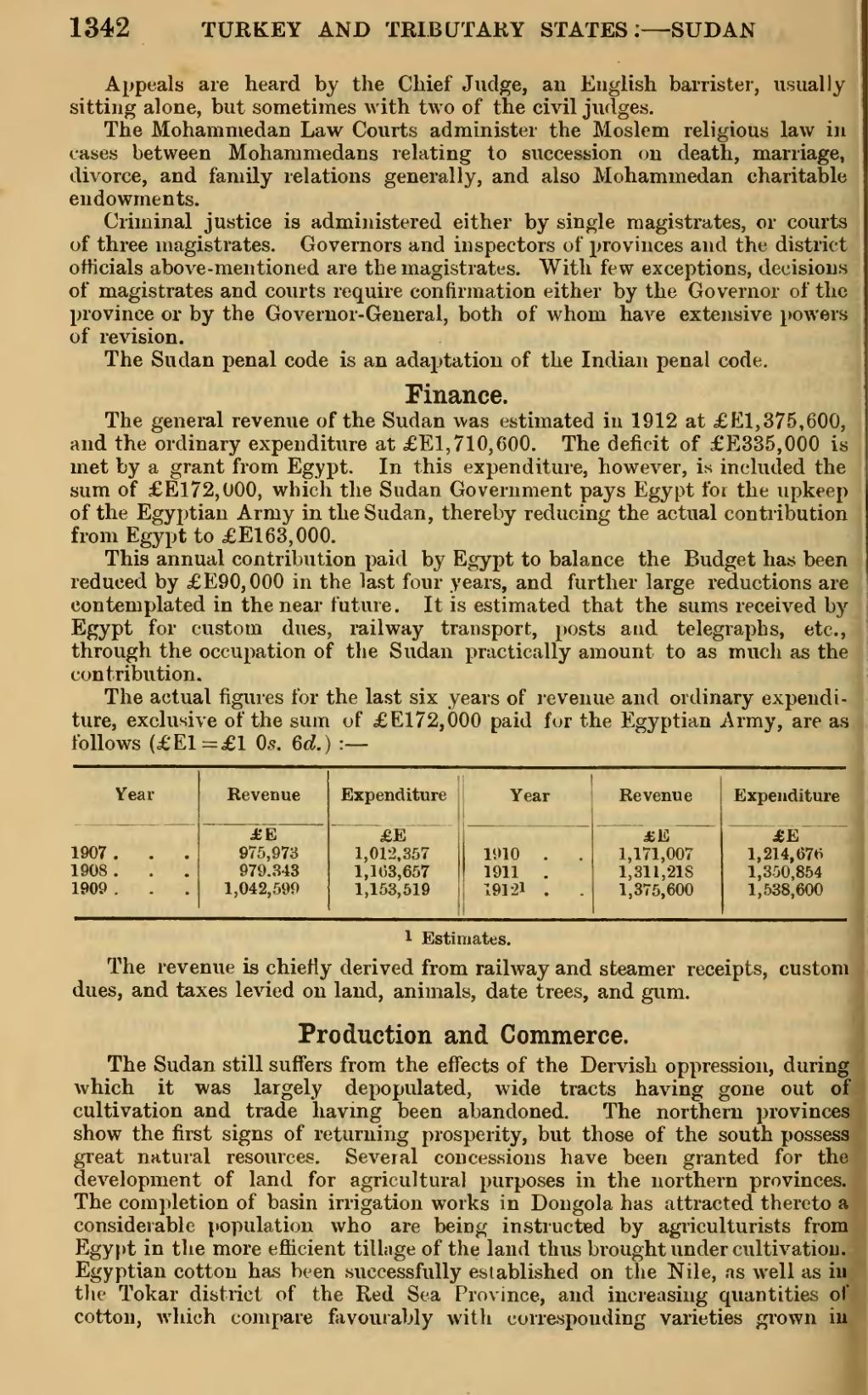1342
TURKEY AND TRIBUTARY STATES: — SUDAN
Appeals are heard by the Chief Judge, an English barrister, usually sitting alone, but sometimes with two of the civil judges.
The Mohammedan Law Courts administer the Moslem religious law in eases between Mohammedans relating to succession on death, marriage, divorce, and family relations generally, and also Mohammedan charitable endowments.
Criminal justice is administered either by single magistrates, or courts of three magistrates. Governors and inspectors of provinces and the district officials above-mentioned are the magistrates. With few exceptions, decisions of magistrates and courts require confirmation either by the Governor of the province or by the Governor-General, both of whom have extensive powers of revision.
The Sudan penal code is an adaptation of the Indian penal code.
Finance.
The general revenue of the Sudan was estimated in 1912 at £El,375,600, and the ordinary expenditure at £E1,710,600. The deficit of £E335,000 is met by a grant from Egypt. In this expenditure, however, is included the sum of £E172,000, which the Sudan Government pays Egypt for the upkeep of the Egyptian Army in the Sudan, thereby reducing the actual contribution from Egypt to £E163,000.
This annual contribution paid by Egypt to balance the Budget has been reduced by £E90, 000 in the last four years, and further large reductions are contemplated in the near future. It is estimated that the sums received by Egypt for custom dues, railway transport, posts and telegraphs, etc., through the occupation of the Sudan practically amount to as much as the contribution.
The actual figures for the last six years of revenue and ordinary expendi- ture, exclusive of the sum of £E172,000 paid for the Egyptian Army, are as follows (£E1=£1 05. 6d.) :—
Year
Revenue
Expenditure i
Year
Revenue
Expenditure
1907 . . .
1908 ,
1909 . . .
£E
975,973
979.343
1,042,599
£E 1,01-2,357 1,163,657 1,153,519
-
1910 .
1911 . 19121 .
£E
1,171,007 1,311,218 1,375,600
^E
1,214,676 1,350,854 1,538,600
1 Estii
nates.
• i
The revenue is chiefly derived from railway and steamer receipts, custom, dues, and taxes levied on land, animals, date trees, and gum.
Production and Commerce.
The Sudan still suffers from the effects of the Dervish oppression, during which it was largely depopulated, wide tracts having gone out of cultivation and trade having been abandoned. The northern provinces show the first signs of returning prosperity, but those of the south possess; great natural resources. Several concessions have been granted for the development of land for agricultural purposes in the northern provinces. The completion of basin irrigation works in Dongola has attracted thereto a considerable population who are being instructed by agriculturists from Egypt in the more efficient tillnge of the land thus brought under cultivation. Egyptian cotton has been successfully established on the Nile, as well as in,' the Tokar district of the Red Sea Province, and increasing quantities of cotton, which compare favourably with corresponding varieties grown in
